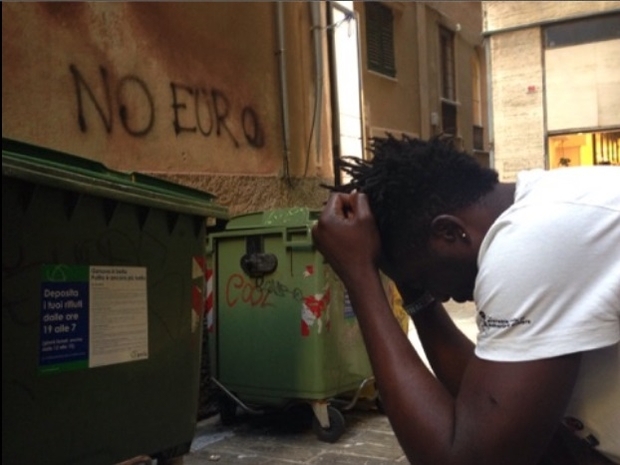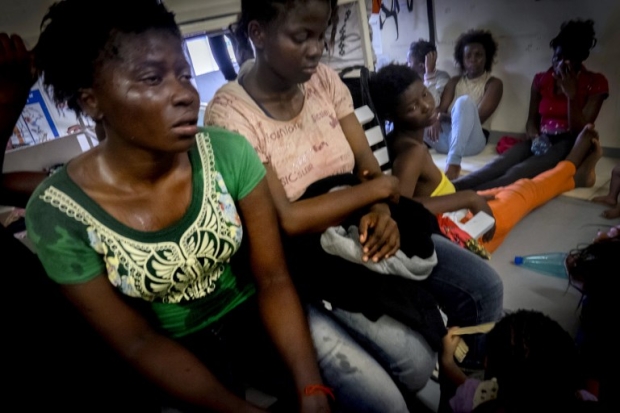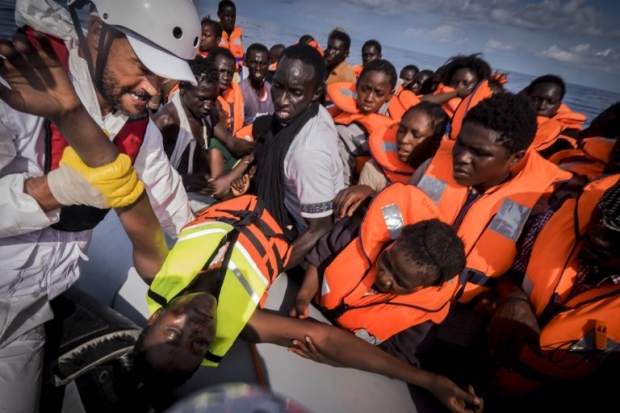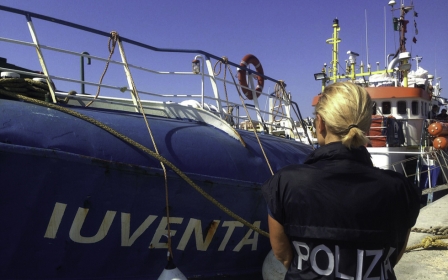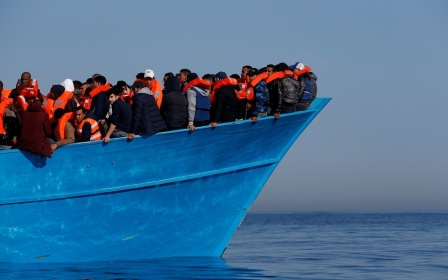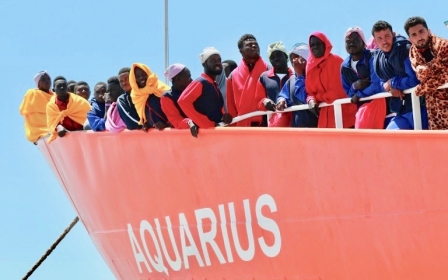The harrowing road to safety: A migrant's journey from Nigeria to Italy
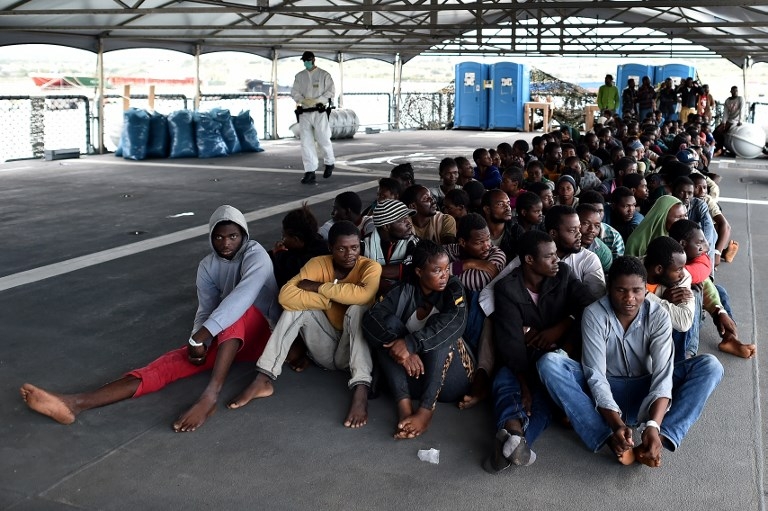
GENOVA, Italy - When 16-year-old Vincent arrived in Sicily in February, he weighed roughly 50kg. Not able to speak due to being in a state of shock, it took him several days before he started talking again.
After the dangers he witnessed as he was smuggled out of Nigeria and into Libya, the trauma was still apparent in what he describes as a vicious experience.
“I lost both of my parents when I was six. My dad died in an accident, and my mom was sick," he told MEE during an interview in Genova’s city centre.
Vincent has two siblings, a boy and a girl. His brother disappeared randomly one day and he believed he was kidnapped, while his sister was taken in by some relatives, after their parents' death.
'We were given very little water and no food. My health was failing. I was in and out of consciousness'
- Vincent, migrant
"I was not allowed [to stay with relatives] because there was not enough room or enough food for me. I spent most days sleeping in abandoned shacks, under cars and on the streets," he said. "I finally found an empty lorry near the edge of town and began staying there."
The lorry's owner showed up eventually and initially shouted and threatened Vincent, before realising that Vincent had nowhere else to go.
Saif, the lorry owner, took Vincent to live with his family in Agadez, in central Niger. On his fourth day of staying with the family, Saif’s brother Amadou* woke Vincent up early, telling him to join him for work. “I trusted Saif and his family for being so generous with me, so I went with Amadou to work... but he betrayed me.”
Vincent waited for around seven hours before a man in a truck arrived and started yelling in Arabic. Vincent could not understand what he was saying. After a few moments, the group crowded into the truck and headed for the desert. “We drove for at least one week, but I can't say for sure because we were given very little water and no food. My health was failing. I was in and out of consciousness," he said.
"If we raised our voices to ask for anything we were beaten with sticks and threatened with guns," he added. When they reached an undisclosed location, Vincent and the others were moved inside a warehouse.
'They beat me badly and threatened to kill me if I didn't pay'
- Vincent, migrant
Vincent took one glance around it and his stomach sank. “That's when I realised we had been kidnapped.”
The migrants were assaulted, threatened and ordered to pay 50,000 Nigerian naira, which amounts to about $150. According to reports, some migrants are forced to call families across West Africa and demand ransoms in exchange for their release. The United Nations reported in June that some captors in Libya even post videos of migrants on social media, to demand ransoms from their families.
“I had no money, I had no one to call either, so they beat me badly and threatened to kill me if I didn't pay.”
Later that night, the police raided the warehouse. “When the police came in, I realised we were in Libya. The police took us all to prison; it was a week of hell," he said.
'A week of hell'
Scared and completely alone, Vincent was packed into a Libyan detention facility that was so overcrowded that people were not able to lie down to sleep. Vincent estimates that there were at least 40 to 50 people crammed into a cement room with no windows.
“The Libyan police regularly threatened to kill us and viciously beat people for no reason," he said.
'They hit me with a gun and cracked my head'
- Vincent, migrant
Vincent pointed to a small scar on his head where hair would no longer grow. "You see? This is from the Libyan police. They hit me with a gun and cracked my head.
“Inside the jail, people were beaten so badly by police with large sticks and even machine guns that I could see many prisoners with disfigured arms and legs," he said. "There was no medical attention [and] so many people's wounds were openly rotting.”
The UN reported in December 2016 that migrants detained in Libya suffer widespread malnutrition, beatings, and a lack of basic healthcare in official detention centres under the control of armed groups. The report also cited abuses by smugglers and traffickers. Infectious diseases have spread in a number of detention centres, where migrants are packed into rooms and are forced to openly defecate and urinate in their cells, according to the report.
According to the International Organisation for Migration (IOM), nearly 300,000 migrants crossed the desert from Niger to Libya between February and December last year, with thousands ending up stranded in Libya. Since the fall of Muammar Gaddafi in 2011, large weapons-trafficking and people-smuggling networks have operated with impunity, militias have grown more powerful, while attempts at establishing a united central government have failed.
'They beat me badly and threatened to kill me if I didn't pay
-Vincent, migrant
Libyan officials have previously complained of being overwhelmed by migrant flows and of lacking the resources to deal with them.
In May, Colonel Khaled al-Azhari, the head of the department for countering illegal migration in Libya's southern region, denied that migrants were beaten or sold by smuggling gangs, or held for ransom.
"The migrants say this because they want to get asylum from European countries," he told Reuters. But he added that police were unable to stop powerful smuggling networks with the little resources they have.
Vincent estimates that he must have spent at least one week in the Libyan detention centre, where his health was waning from the beatings and malnutrition.
"We were given food sometimes, maybe once a day, but sometimes not at all," he said." It looked like lentils, but it smelled like garbage.”
'I believed he was my friend'
One day, a local barber showed up and spoke English, so he could communicate with Vincent. "He was the only person I could really talk with, so I believed he was my friend," he said. Vincent had learned some English before dropping out of school when his parents died.
“I’m not sure how he did it, probably through corruption or some kind of deal. The barber was able to free me. I was ecstatic.”
'The barber made me his slave'
-Vincent, migrant
However, the barber had others plans for him. “The barber made me his slave,” he said.
According to Vincent, the barber forced him to work in a car wash without any pay. Vincent lived in a small room in the same building as the car wash.
"I worked at the car wash for at least 12 or more hours a day. The [boss] made me wash cars and oil stains along with other tasks," he said.
"They did not provide me with any gloves, so the work would make me feel sick from all the chemicals," he said in a trembling voice.
This went on for at least five to six months until one night the barber awoke Vincent in the middle of the night and told him to get ready to leave.
"I was confused about where we were going. The barber didn't say anything the entire drive," he said.
“I'm not sure why he helped me or how, but he did, and now I'm here,” he said.
According to Vincent, the smugglers had shot at least one person who refused to jump into the sea to reach the boats awaiting them.
"There was at least five or six boats when we began our journey in the sea, but within an hour I could only see two other boats," he said. "I don't know what happened to the boats of refugees. I think they must've drowned."
According to the IOM’s Missing Migrant Project, over 2,000 people have drowned trying to cross the Mediterranean sea until August this year.
'A better life'
After at least two hours at sea, Vincent said that the Italian coastguard came and saved them.
"When we saw the large ship of the Italians we all got excited. Some people had to be stopped from jumping out of our boat," he said.
Now aboard an Italian coastguard vessel, Vincent was given clean, warm clothes and some food and water by the Italian authorities.
"I could barely eat or drink. I think I was in shock or something, but I couldn't speak. I just kept crying," he said.
According to Doctors Without Borders (MSF), many refugees who make it to safety are suffering from mental health issues and depression.
“These experiences are having a severe impact on the mental health of refugees and there needs to be a system in place to deal with this,” Aurelie Ponthieu from Doctors Without Borders told MEE.
Vincent was brought to Sicily where he was registered by Italian authorities at a holding facility. After spending a few days there, Vincent was put on a bus and sent to the Italian city of Genova, where he was escorted to a small flat in an old apartment building being used by the city to house refugees.
"I'm happy to be here in Italy, but the authorities placed me in a home with grown men. They eat my food and push me around since I'm the youngest," he said.
Since MEE's last meeting with Vincent, he has been granted a two-year stay, which means he can legally work in the country. He is now learning Italian and hopes to secure a job soon. Vincent still has a long path ahead, but he said at least he has a chance for a better life.
Additional reporting by Teresa Vinni
* Some names have been changed for security reasons
Middle East Eye propose une couverture et une analyse indépendantes et incomparables du Moyen-Orient, de l’Afrique du Nord et d’autres régions du monde. Pour en savoir plus sur la reprise de ce contenu et les frais qui s’appliquent, veuillez remplir ce formulaire [en anglais]. Pour en savoir plus sur MEE, cliquez ici [en anglais].


